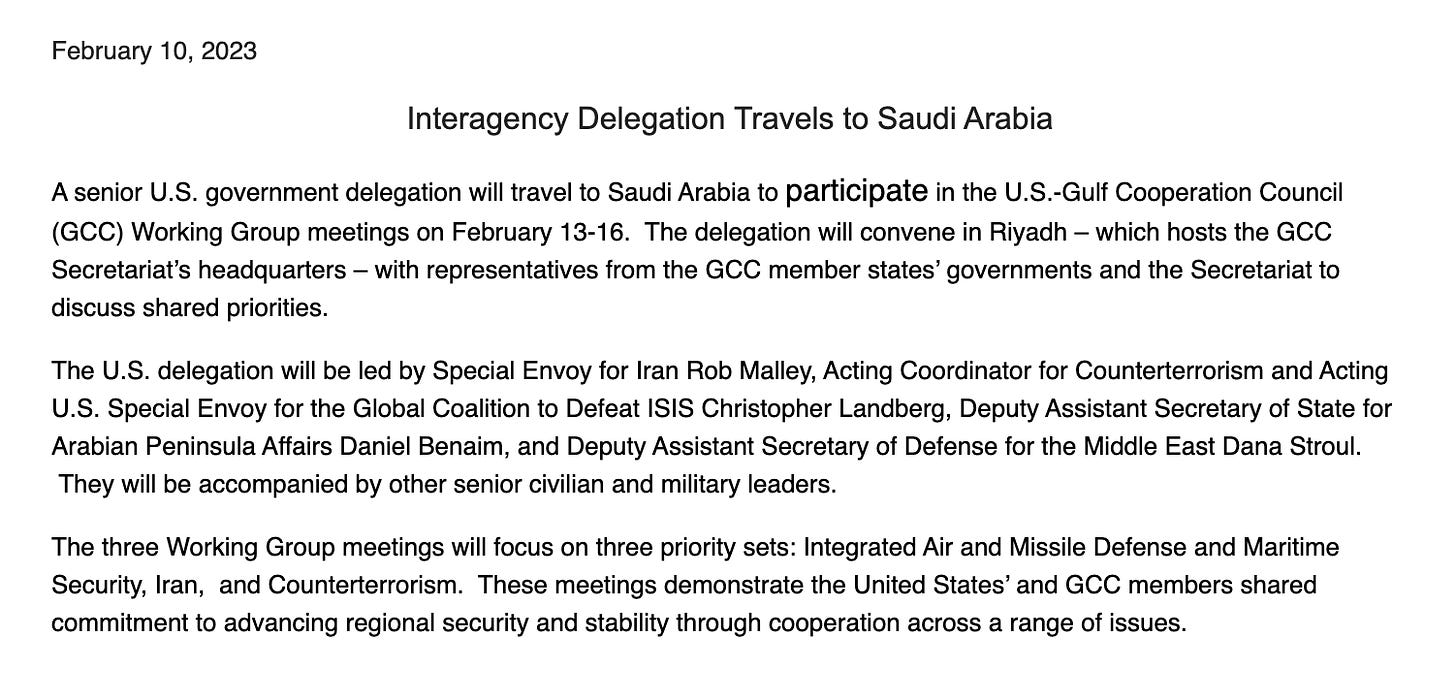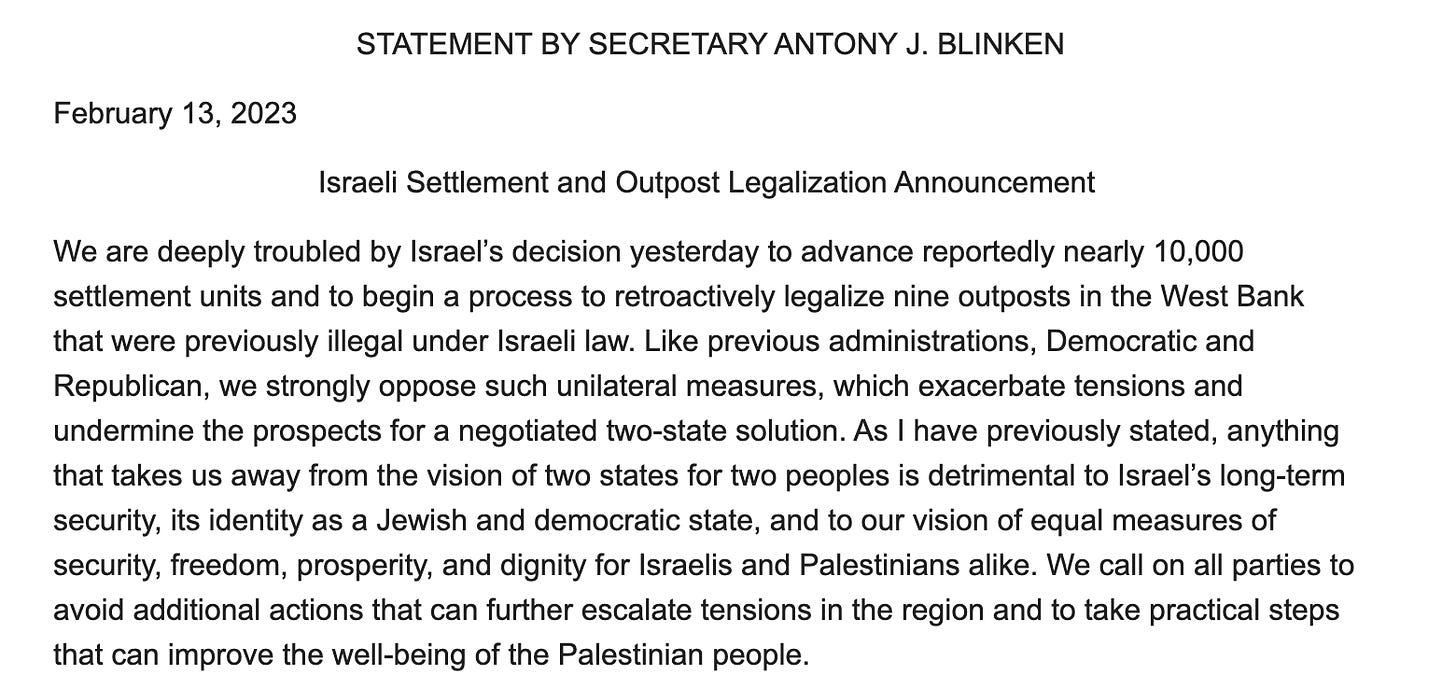A quick one this week.
This is just a quick note to say thank you all for being here. I hope you're having a lovely weekend and enjoying this international news roundup.
Until next Sunday,
Cristina
What I'm writing:
• Momentum is growing, in Congress and European capitals, for a special international tribunal to prosecute Russian President Vladimir Putin for the crime of aggression against Ukraine. This story is unlocked and free to read.
NEW: Momentum is growing for a special international tribunal to prosecute Russian leaders for the crime of aggression against Ukraine.
Ukrainian activists have been calling for this for months. But now they have support from key allies in Congress. https://t.co/14u26w5vrK— Cristina Maza (@CrisLeeMaza) February 17, 2023
• A bipartisan group of senators introduced a bill that would give a senior administration official the ability to coordinate the U.S. government's handling of ISIS detainees. Lawmakers are increasingly concerned about the fate of the sprawling prison complexes in northern Syria, which house tens of thousands of people suspected of being Islamic State militants or their family members.
“The prisons include the most dangerous terrorists in the world from more than 57 nationalities, and these prisons are not well-maintained,” Bedran Çiya Kurd, the top diplomat for the Autonomous Administration of North and East Syria, told me.
• Dozens of lawmakers are traveling abroad on several crucial congressional delegations at a point of increasing global instability. My colleague Savannah Behrmann and I look at this year's Munich Security Conference and Senator Chuck Schumer's trip to Israel. This story is unlocked and free to read.
What I'm reading:
• Read my friend Giorgi Lomsadze's beautiful tribute to his father, who passed away last month, in EurasiaNet. It's a story about how his father traveled from Soviet Georgia to the Russian city then known as Leningrad to woo his mother. And it's wonderfully written family tale that describes life at the end of the Soviet Union.
• For years, a secret organization run from inside Russia’s parliament successfully interfered with European policies on occupied Ukraine, the Organized Crime and Corruption Reporting Project reports.
• Russia has “lost strategically, operationally and tactically” in Ukraine, Gen. Mark Milley, chairman of the U.S. Joint Chiefs of Staff, said. The Washington Post has the story.
• Russia has deployed 97 percent of its army in Ukraine but is struggling to advance, the Wall Street Journal reports.
• As Russia begins a new offensive in eastern Ukraine, the U.S. and its allies are skeptical that Moscow has amassed the manpower and resources to make significant gains. “It’s likely more aspirational than realistic,” a senior U.S. military official told CNN.
• A new research series by New America, Uncovering the Wagner Group, investigates the origins, operations, and sprawling online ecosystem of the notorious paramilitary that became the tip of Russia's spear in Ukraine.
• Belarusian President Alexander Lukashenko said that Belarus would not send troops to Ukraine unless the country is attacked, CNN reports.
• In a televised address, Moldova’s pro-European president accused Russia of trying to overthrow its democratic system of government and promote pro-Russian forces on the country’s border with Ukraine. The Wall Street Journal has the story.
It’s official. Moldova has a new (pro-European) PM https://t.co/GuV85GkfnT
— Paula Erizanu (@paulaerizanu) February 16, 2023
• In Moldova, pro-Russian parties, led by the fugitive oligarchs Ilan Shor and Vlad Plahotniuc, plan protests in the center of Chisinau against the pro-Western government and low living standards, Balkan Insight reports.
• Poland’s hopes of getting billions in European Union recovery funds were derailed when President Andrzej Duda sent a crucial bill that rolls back judicial reforms to a top court – the Constitutional Tribunal – for adjudication, Politico Europe reports. The move was a massive blow to the nationalist government, desperate to get the EU cash ahead of the parliamentary election this fall.
• The number of people applying for 'Golden Visas' in Greece has risen sharply now that the minimum investment in one will double in price this spring, Balkan Insight reports.
• Seven people were arrested in Bulgaria a day after the bodies of 18 Afghan migrants were found in an abandoned truck near the village of Lokorsko outside capital, Sofia, Radio Free Europe reports.
• Nicola Sturgeon, the figurehead of the Scottish independence movement, dramatically announced that she would resign after eight years as Scotland’s first minister, CNN reports.
• The U.S. ambassador to the United Nations urged the Security Council to authorize more border crossings to rebel-controlled northwestern Syria so humanitarian assistance can enter the country after last week's devastating earthquake. Reuters has the report.
• Syria’s president, Bashar al-Assad, agreed to open two additional border crossings from Turkey into opposition-held territory in northwestern Syria, the New York Times reports.
• Christian Atsu, a Ghanaian soccer star, has been found dead under earthquake rubble in Turkey. He was 31. Yahoo Sports has the story.
• The devastation caused by last Monday’s earthquake raised questions about an amnesty that allowed property owners in Turkey to have construction violations forgiven without bringing their buildings up to code, the New York Times reports. While the Turkish government has responded by arresting contractors with ties to collapsed buildings, some have pointed to the role of the current and previous governments in keeping the system as it was.
• Israeli President Isaac Herzog asked Prime Minister Benjamin Netanyahu to delay making sweeping changes to the country’s judicial system, the Wall Street Journal reports.
• Roughly 100,000 protestors from across Israel filled the street outside Parliament in Jerusalem to oppose the sweeping judicial overhaul proposed by Israel’s new government, the New York Times reports.
• A new report by United Nations experts identified Saif al-Adel as the new “de facto and uncontested” leader of al-Qaeda, the Washington Post reports. Adel, a former member of the Egyptian military, is wanted by the U.S. in connection with the 1998 bombings of its embassies in Tanzania and Kenya. Many United Nations member states believe that Adel is currently in Iran.
• Brazil will not sell weapons or ammunition to Ukraine, Brazil’s president Luiz Inácio Lula da Silva told the New York Times. Instead, the Brazilian leader said he wanted to try to help mediate peace.
• Tunisian authorities detained a handful of opposition figures and businessmen viewed by President Kais Saied as threatening his rule, the Wall Street Journal reports.
• Cambodian Prime Minister Hun Sen ordered the shutdown of one of the country’s last independent news outlets, the New York Times reports. The decision to close the Voice of Democracy comes as the country’s leader seeks to suppress opposition ahead of elections in July.
• Indian tax authorities raided the BBC’s offices in New Delhi and Mumbai and seized its journalists' phones, the Washington Post reports. The move appeared to be retaliation over the British broadcaster's airing of a polarizing documentary examining the rise of Indian Prime Minister Narendra Modi.
• Separatists in Indonesia's Papua region released images that show a New Zealand pilot taken hostage last week in good health, Reuters reports. But they pledged he would not be freed until authorities acknowledged the area's independence.
What the State Department says:
You can write to me for any reason: c.maza@protonmail.com.







